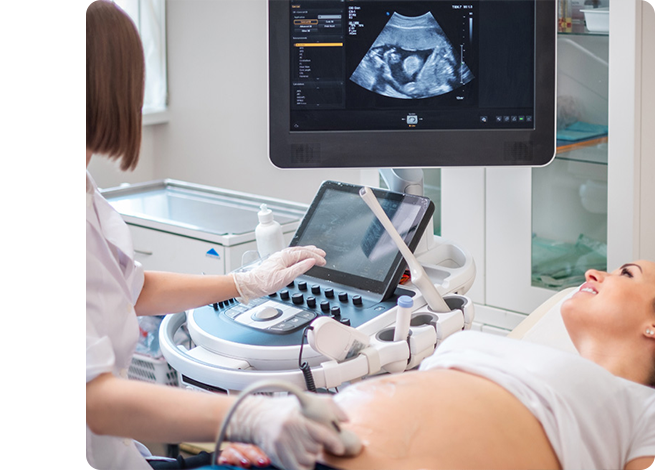Obstetric ultrasound services
The following ultrasound examinations are available at Harmony Ultrasound Imaging
- Dating Ultrasound – performed in the first trimester.
- Integrated Prenatal Screening (IPS) – performed between 11 and 14 weeks.
- Measurements of the Nuchal Translucency – a collection of fluid under the skin at the back of a baby’s neck will be taken. The patient will also be required to perform IPS bloodwork at this time. IPS forms should be provided and completed by your health care provider, and presented at the time of your appointment.
- Morphology/Anatomy Ultrasound – performed after 18 weeks gestation. Images and measurements of all fetal anatomy will be obtained. Incomplete anatomy ultrasound examinations may require a follow up ultrasound which may be booked prior to the patient leaving the department or by your health care provider.
- Level 2 Ultrasound – performed between 18-21 weeks (or any time during second and third trimester). Level 2 or targeted ultrasounds are usually ordered by your physician or health care provider when there is some increased risk in your pregnancy or as a method to complete images that may have been difficult during a previous ultrasound examination. Your physician/health care provider may ask that special attention be given to specific parts of the baby – the brain, the heart, or other organs.
The following ultrasound examinations are available at Harmony Ultrasound Imaging
- Level 2 Ultrasound – performed between 18-21 weeks (or any time during second and third trimester). Level 2 or targeted ultrasounds are usually ordered by your physician or health care provider when there is some increased risk in your pregnancy or as a method to complete images that may have been difficult during a previous ultrasound examination. Your physician/health care provider may ask that special attention be given to specific parts of the baby – the brain, the heart, or other organs.



There are no special preparations required for this type of ultrasound. You may have a support person with you during the procedure but any accompanying children should remain supervised in the waiting area. This exam will take ~30 minutes.
- Growth Study/Biophysical Profile – performed in third trimester. Growth studies may be performed to monitor the growth of your baby. They cannot be done on a weekly basis as this can result in inaccurate weight estimations – they should only be done after 10 – 14 days from the previous exam (if necessary).
Biophysical profile is an ultrasound that screens for fetal well being – this is generally done in combination with a growth study but may be ordered by your health care provider if necessary. Biophysical profiles assess different parameters in order to assure that your baby is moving well and in a healthy environment.
- Doppler Ultrasound – performed in second and third trimester. A doppler ultrasound measures blood flow in the umbilical cord and vessels in the babies head, heart and abdomen. These measurements can provide details about the babies circulation.
- Fetal Echocardiography– performed in second and third trimester. This type of ultrasound provides a detailed image of the baby’s heart and blood vessels. It may be used to confirm or rule out a congenital heart defect.
What to expect on day of ultrasound
During a standard fetal ultrasound, your sonographer will apply an ultrasound gel to your abdomen as you recline on an exam table. The sonographer will move the transducer over your abdomen in order to obtain all required information.
Safety
- Medically indicated fetal ultrasounds are safe for both the mother and baby. There are no adverse effects from fetal ultrasound on children.
Preparation
A full bladder is required for obstetrical ultrasound examinations – one litre of fluid one hour prior to the ultrasound examination is required after 28 weeks of pregnancy.
